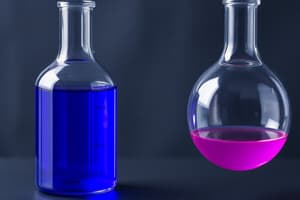Podcast
Questions and Answers
Which type of compounds are formed due to the transfer of electrons?
Which type of compounds are formed due to the transfer of electrons?
- Covalent compounds
- Metallic compounds
- Molecular compounds
- Ionic compounds (correct)
What type of bonding leads to the formation of molecular compounds?
What type of bonding leads to the formation of molecular compounds?
- Hydrogen bonding
- Covalent bonding (correct)
- Metallic bonding
- Ionic bonding
In which physical state can molecular compounds exist?
In which physical state can molecular compounds exist?
- Solid only
- Liquid only
- Gas only
- Solid, liquid, or gas (correct)
What type of compounds are good electrical conductors?
What type of compounds are good electrical conductors?
Between which types of elements are molecular compounds formed?
Between which types of elements are molecular compounds formed?
Which type of compounds are formed when atoms are linked together by sharing of electrons?
Which type of compounds are formed when atoms are linked together by sharing of electrons?
What physical state can ionic compounds exist in?
What physical state can ionic compounds exist in?
Between which types of elements are ionic compounds formed?
Between which types of elements are ionic compounds formed?
What type of bonding leads to the formation of molecular compounds?
What type of bonding leads to the formation of molecular compounds?
What type of compounds are good electrical conductors?
What type of compounds are good electrical conductors?
Flashcards are hidden until you start studying
Study Notes
Electron Transfer and Compound Formation
- Compounds formed from the transfer of electrons are called ionic compounds.
- Ionic compounds are typically formed between metals and nonmetals due to the transfer of electrons from the metal to the nonmetal.
Molecular Compounds and Bonding
- Molecular compounds are formed through covalent bonding, which involves the sharing of electrons between atoms.
- This type of bonding primarily occurs between nonmetals.
States of Matter for Compounds
- Molecular compounds can exist in various physical states: solid, liquid, or gas.
- Ionic compounds typically exist in solid form at room temperature due to their strong ionic bonds.
Electrical Conductivity of Compounds
- Ionic compounds are good electrical conductors when dissolved in water or melted, as their ions are free to move.
- Molecular compounds generally do not conduct electricity because they lack free-moving charged particles.
Element Interactions
- Molecular compounds form specifically between nonmetals, which share electrons to achieve stable configurations.
- Ionic compounds are formed through the interaction between metals and nonmetals, resulting in the formation of charged ions.
Studying That Suits You
Use AI to generate personalized quizzes and flashcards to suit your learning preferences.




